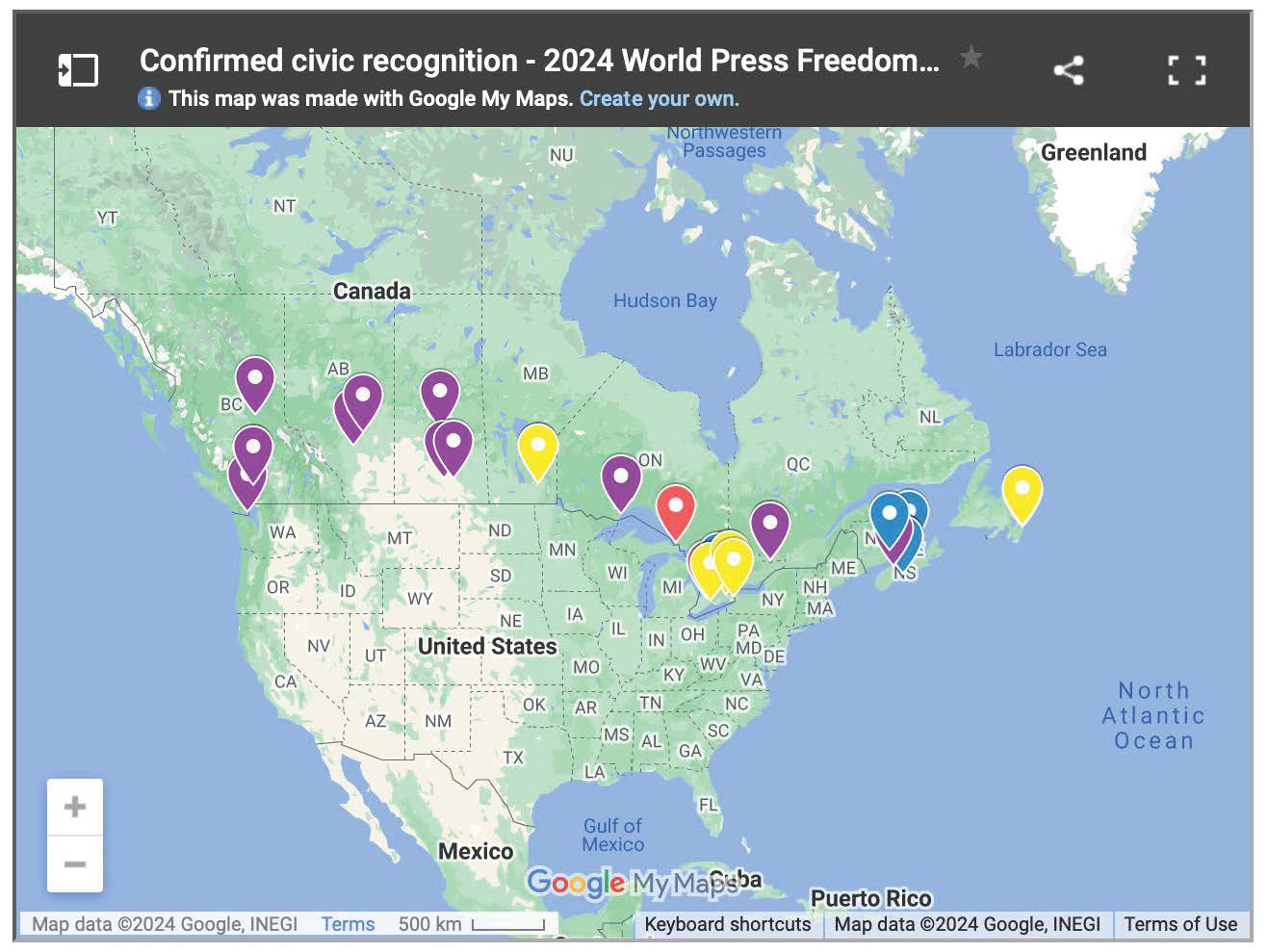Mirko Petricevic worked in the Waterloo Region Record newsroom for 28 years as a photographer, reporter and copy editor. In 2014, he decided to pivot to work in communications after The Record’s copy desk moved to a sister newspaper (The Hamilton Spectator). He is a National Newspaper Award finalist and National Magazine Awards silver winner. He has an undergraduate degree in photography and master’s degrees in journalism and theological studies. Recently retired, he’s now focused on leading campaigns with Ink-stained Wretches, a grassroots advocacy group working to build a culture of appreciation for quality journalism. One of the campaigns received a 2023 Gold Quill Award from the International Association of Business Communicators (IABC).
Press freedom is getting a shout-out across Canada this week.
Dozens of municipalities, provinces and world-famous landmarks are issuing proclamations, raising UN flags and illuminating signs, bridges and city halls as a way to spotlight World Press Freedom Day .
Some of those pats-on-the-back come thanks to the grit and grunt work of journalism and communication students.
As they have for the past three years, a handful of students have participated in the press freedom campaign run by Ink-stained Wretches, a grassroots advocacy group working to build a culture of appreciation for quality journalism.
As chief ink-stigator of the group — founded in 2020 by former Waterloo Region Record newsroom staffers — I invited faculty at half a dozen journalism schools to join our annual campaign to secure mayoral or council proclamations recognizing WPFD.
Western University in London, Ont., my alma mater (MA journalism 1998), came aboard. So did the j-school at the College of the North Atlantic in St. John’s, NL. World Press Freedom Canada and the Canadian Commission for UNESCO round out our cadre of campaign partners.
In addition to organizing a journalism film festival, advocating for public recognition of press freedom is Ink-stained Wretches’ marquee campaign. Since launching it in 2022, we have secured more than 70 public acknowledgements of WPFD from dozens of different entities (mostly municipalities) headed by hundreds of elected leaders.
Students secured 18 of those acknowledgements.
Given the closure of news outlets during the past 15 years and gutting of newsrooms that have survived, getting faculty and students involved in recognizing the value of press freedom is a small but significant gesture at this all-hands-on-deck moment.
So this WPFD, my hope is that j-school — as well as media and communications — faculty across Canada will check out our campaign and consider giving their students hands-on experience advocating for a cause that’s near and dear to our democracy. As recent cases of press freedom violations show, this is not a time to take freedom of the press for granted in our country.
- ••
Students in Erin Isings’ advanced communications class at Western University have worked with us on the civic recognition project these past three years.
“Participating in the campaign gives students some ownership over those seemingly small steps that can really have a big impact,” said Isings, assistant professor and teaching scholar in the university’s faculty of information and media studies.
Western’s master of media in journalism and communication is designed to teach practical skills as well as academic concepts, she said. And working on the civic recognition campaign helps students reinforce their classroom learning.
For example, in their introductory communications class, students learn that they need to tailor messages to specific target audiences.
Last year, a student who pitched a proclamation to city council in Iqaluit received an unexpected response — his draft wording had to be translated into South Baffin Inuktitut.
This year, a student who requested a proclamation from the Sault Ste. Marie, Ont., was required to record and submit a short video about WPFD.
Before those campaigns ended, both cities agreed to issue proclamations.
But that’s not always the case. Sometimes requests are turned down or simply go unanswered. (This year, Western students secured seven recognitions from the 15 municipalities assigned to them.)
When that happens, Isings said, students often worry their grades will suffer, though they don’t. Lessons are learned even when their requests are denied.
So, Isings added, working on the campaign has also taught students that advocacy takes commitment.
“They’ve had the opportunity to practise persistence and patience,” she said.
- ••••
For some students, it’s a lesson that endures.
“Persistence is key,” said Celeste Laube Benini, one of Isings’ students. “If you want to get something done, make sure to stick with it and don’t give up.”
Laube Benini entered Western’s program after completing an undergraduate degree in political science at the University of Waterloo.
Working toward a communications career in the public sector, she was a little surprised by some of the reaction to her campaign efforts.
“Municipalities were less responsive than I thought they would be,” she said.
After submitting a municipality’s online form requesting a proclamation or a flag raising or illumination of a piece of infrastructure, she often wouldn’t hear back.
The amount of time it took to follow up was a little frustrating, she noted, but not entirely discouraging.
“It’s just learning how to navigate government, I guess. It’s definitely a skill that I had to hone in this case.”
By the end of the project, Benini secured WPFD acknowledgements from three of the five Ontario targets assigned to her: A proclamation from London; a commitment from the mayor of the Municipality of Strathroy-Caradoc to read a statement at council and post about WPFD on social media; and a proclamation from Sault Ste. Marie.
“I think having that hands-on experience was really helpful to actually learn about the issue of government relations rather than just learning about it in a lecture,” she added.
- ••
It is uplifting to see another cohort of students primed to promote press freedom go into their communities and new workplaces at the end of each school year.
Working alongside them makes me just a little more hopeful about the future of journalism and democracy in Canada. It makes it a little less hard to swallow bad news about the news business.
Isings said working on the campaign reminds her students about the importance of appreciation for local journalism.
“But it’s also a reminder for them, in their work, to be fighting the good fight.”


